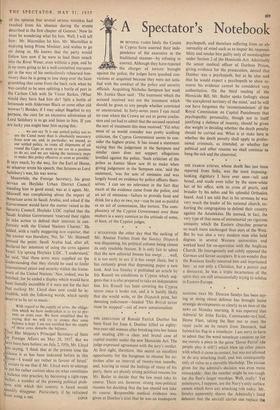A Spectator's Notebook
IN SEVERAL CASES lately the Courts in Cyprus have asserted their inde- pendence of the executive in the traditional manner—by refusing to convict. Although they have rejected the charges of torture brought against the police, the judges have quashed con- victions or acquitted because they were not satis- fied with the conduct of the police and security officials. Acquitting Nicholas Sampson last week Mr. Justice Shaw said : The treatment which the accused received was not the treatment which should be given to any people whether convicted or unconvicted. In forty-seven years I can recall no case where the Crown set out to prove confes- sion and yet had to admit that the accused received the sort of treatment this man received.' Yet what most of us would consider was pretty scathing criticism, the Cyprus Government seems to con- sider the highest praise. It has issued a statement saying that the judgement in the Sampson and similar cases does not support allegations levelled against the police. 'Such criticism of the police as Justice Shaw saw fit to make when giving judgement in the Sampson case,' said the statement, 'was for acts of omission and was largely based on evidence by police officers them- selves.' I can see no relevance in the fact that much of the evidence came from the police, and an act of omission—failure to provide food and drink for a day or two, say—can be just as painful as an act of commission, like torture. The com- placency of the Cypriot Government over these matters is a sorry contrast to the attitude of some, at least, of the Cypriot judges.










































 Previous page
Previous page